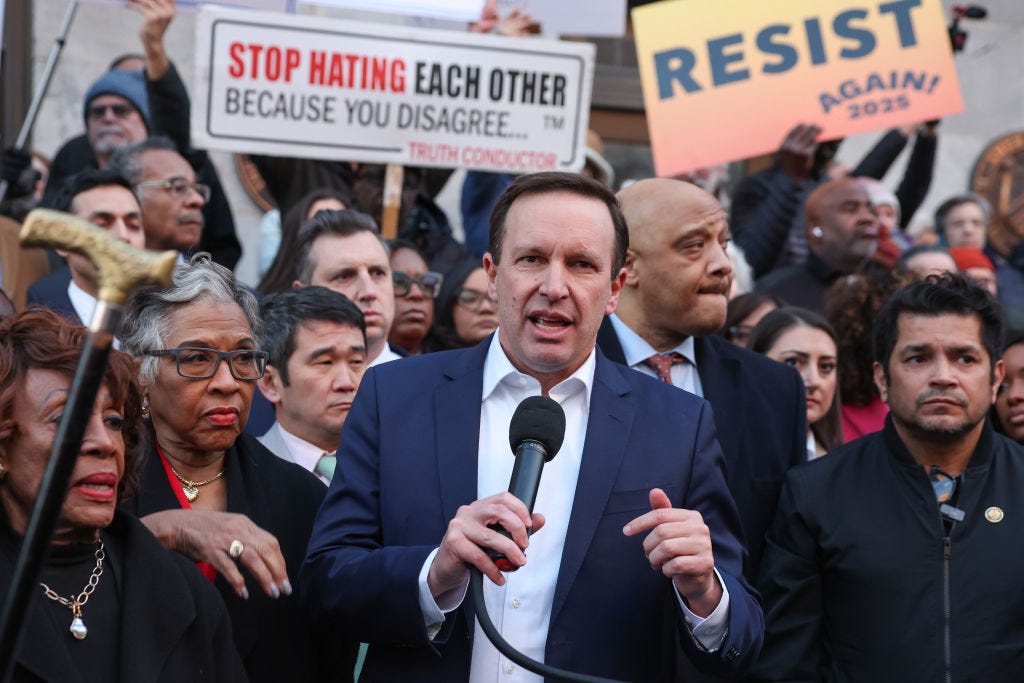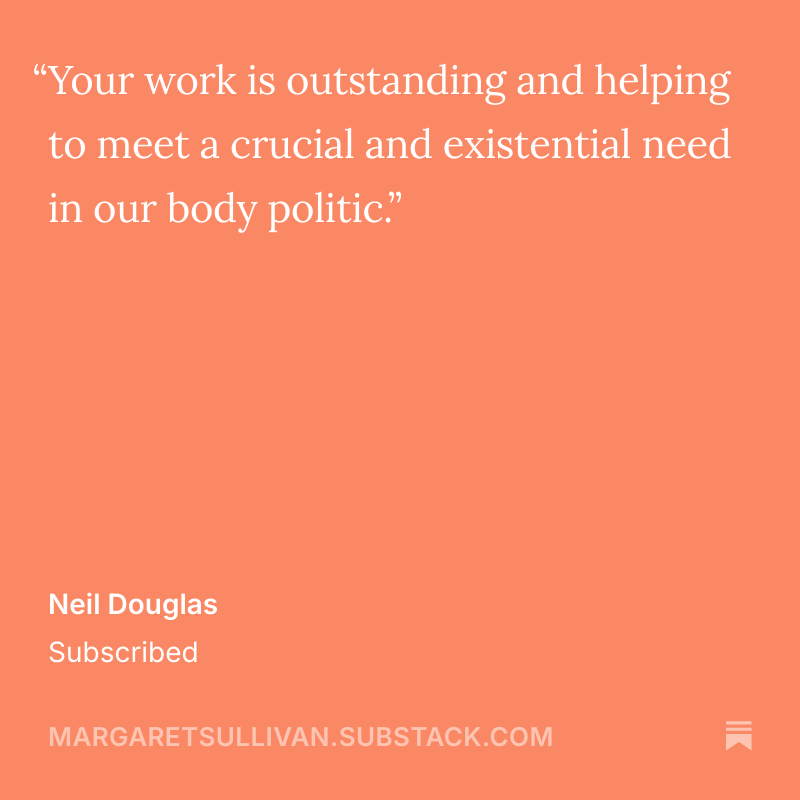We need righteous indignation and truth-telling, not complacency
The tone, in media and politics, is far too restrained for our current emergency
Jamelle Bouie gets it. The New York Times columnist wrote something a few days ago that stood out to me because it was so directly stated and so horrifyingly correct.
It began: “Even if anyone had elected Elon Musk to anything, the past week would still be one of the most serious examples of executive branch malfeasance in American history.”
Bouie went on: “Musk has seized hold of critical levers of power and authority within the federal government, apparently enabling him to destroy federal agencies at will, barring congressional action or judicial pushback.” The piece was titled, “There is No Going Back.” Here’s a gift link. Read it in full and weep for what we’re losing, day by day.

But Bouie’s sense of alarm, well founded as it is, is strangely rare in Big Journalism these days.
Witness, for example, a piece last week by Jason Willick, a regular opinion columnist at the Washington Post, who wrote something titled “Save the panic over Trump’s ‘power grabs.’ It might be needed later.”
Calm down, Willick counseled, mocking the idea that a coup is underway, and concludes that, instead of having what he calls a “meltdown,” everyone should just wait and see. Why? Because, he argues, casting Trump and Musk’s early moves as a constitutional crisis “will diminish the force of such warnings if they are needed.”
Willick was appropriately blasted in the reader-comments section: “This sycophantic, willfully delusional apologia for the dismantling of the American republic and the shredding of the constitution … is contemptible sophistry of the very worst kind,” said one. Read Willick’s column, if you have the stomach, and judge for yourself; here’s a gift link.
Overall, the tone in the major media is much more like Willick than Bouie.
For example, the popular Times newsletter, The Morning, offered this tepid headline one day last week: “A Constitutional Crisis?” Then it considered the question from various angles, including only one quote from a lawmaker — Republican senator Thom Tillis of North Carolina who notes that what Trump and Musk are doing “runs afoul of the Constitution in the strictest sense,” but “nobody should bellyache about that.”
As Jamelle Bouie put it in the column I mentioned above, no question mark is appropriate here. In fact, calling what’s happening a constitutional crisis “does not even begin to capture the radicalism of what is unfolding in the federal bureaucracy.”
And on Tuesday of last week, after a day in which Musk wreaked all kinds of havoc, particularly at the U.S. Agency for International Development, which was essentially shut down, the print front page had other things on its mind.
As a friend observed: “The New York Times print edition has nothing on the front page about the abrogation of our constitution. Coverage starts on page 9.” It was true. You had to wade pretty far into the paper to see articles about the shocking events at USAID, despite a paragraph like this one: “Many of the cuts were rolled out in secret and without warning, as representatives of Elon Musk who was deputized by President Trump to lead a task force to reduce government spending, took over its operations…”
Does this lack of alarm matter? You bet it does — The Morning newsletter (the Times’s largest and most popular) has more than 17 million subscribers. Like the printed front page (yes, still), it could be a way for The Times to really focus attention on the gravity of what’s happening. But no.
Some, in politics, get it. Here’s a social media post from Vermont senator Bernie Sanders: “The world’s richest man has decided that the world’s richest country shouldn’t help some of the world’s poorest people. This is blatantly illegal. An unelected billionaire cannot simply shut down federal agencies authorized by Congress at will.”
Righteous indignation like that is hard to come by. That’s why I wrote a Guardian column last week about two new-generation Democrats who have become strong voices: Congresswoman Jasmine Crockett of Texas and Senator Chris Murphy of Connecticut. I quoted political consultant Sawyer Hackett: “There’s been no better messenger in the first two weeks of Trump 2.0 than Chris Murphy. At a time when too many Democrats are afraid of their shadow, Murphy is showing how to fight back with a compelling populist message that should be a blueprint for the Democrats moving forward.”
My Guardian editor asked me to include a paragraph at the end about what’s giving me hope right now. You can read that, and the rest of the column, here.
As we see Trump embrace Project 2025 in so many horrific ways, I’m pursuing my own Project 2025, as I promised here a few weeks ago: To point out the good, the bad, the inspiring and the disappointing in the news media. Maybe journalism can’t save democracy — that’s a question I’ve been preoccupied with for years and the immediate answer is far from encouraging. But good journalism can, at least, clearly and powerfully communicate the truth.
Not everyone is doing that. But some are. Wired magazine is out front on many aspects of the Musk takeover story, doing great reporting and getting scoop after scoop. On her Substack, The Present Age, Parker Molloy went into detail about that, and she’s right.
I find Josh Marshall of Talking Points Memo consistently perceptive — as is the New Republic’s Greg Sargent who does an excellent politics podcast called the Daily Blast. I also want to note — despite my criticism of the Times and the Washington Post — that their hard-news reporting is indispensable. The Post, with its reporters’ deep sources in federal agencies, has been impressive, day after day. Here, with a gift link is one big-picture example from The Post under four bylines, titled, “In chaotic Washington blitz, Elon Musk’s ultimate goal becomes clear.” This is important work that makes me proud of my former Post colleagues.
Please tell me where you’re turning these days for dependable information and inspiration. I implore you not to tune out, despite the understandable temptation to do so. Staying engaged — giving a damn — might be the best thing you can do for your country. If there is to be some redemption ahead, we cannot yield to what William Butler Yeats wrote in his great 1919 poem, “The Second Coming,” which describes post-war Europe teetering on the edge of chaos and engulfed in corruption: “The best lack all conviction, while the worst are full of passionate intensity.”
Thank you all very much for reading American Crisis. As you know, I’ve removed the paywall here so everyone can freely read and comment. Many of you have chosen to become paid subscribers; please know that I appreciate that support and encouragement immensely. But I’m happy to have you here either way and I read your comments with interest and appreciation.







The tyrant feeds on fear and hush,
On silence bent by weary dust.
A single voice may seem too thin,
Yet echoes grow when whispers twin.
They tell us, “Bow, accept, comply,”
But truth still burns behind the eye.
A chain is strong when hands enlace,
A thousand sparks can light a place.
So gather, weave, resist, persist,
The tide will turn, the dawn insists.
No power holds when all arise—
Do not panic, organize.
I’m reading and watching The Contrarian, Joyce White Vance, and Heather Cox Richardson